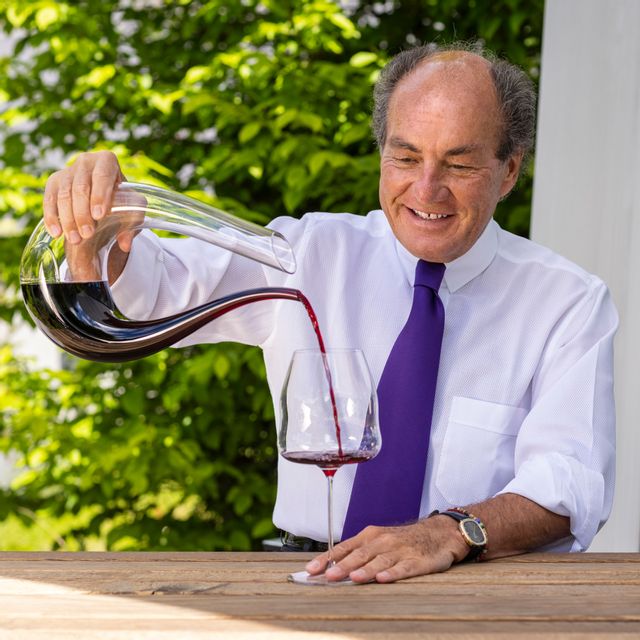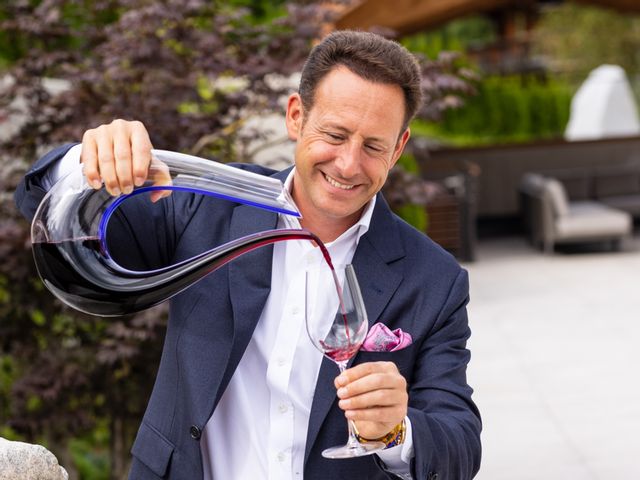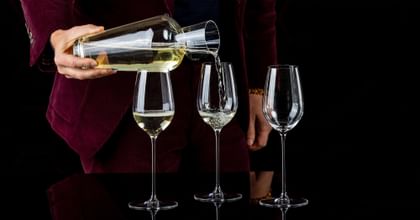decanting
Decanting for Young and Old Wines

The importance of decanting to getting the best out of wine of any age.
At RIEDEL, we advocate the importance of decanting all wines, as any wine can benefit from being decanted – be it white, red, or sparkling wine, or old and young wines. In this piece, we focus on the benefits and differences in decanting young and old wines - specifically, the different reasons why they benefit from decanting, plus the contrasting approaches to take when decanting young and old wines.
The benefits of decanting young wines
Decanting a young wine can have the remarkable effect of helping it to mature further through aeration. This exposure to oxygen softens the wine's tannins and reduces any harsh flavors, resulting in a more approachable wine with better-developed and integrated flavors and aromas. Of course, the extent of the effect of decanting will vary from wine to wine, but all these interactions that see a younger wine's qualities blossom are made possible through the process of decanting and allowing a wine to breathe properly prior to consumption.

How to decant young wines
When decanting a young wine, we recommend you pour it vigorously into your RIEDEL decanter of choice. By energetically upending a young bottle of wine into a decanter, you aerate the wine entirely and vigorously, revealing greater aromatic expression and more character and complexity.
With most of our RIEDEL decanters having a capacity exceeding 1 liter, we usually recommend that you decant an entire 750ml bottle of wine into them. If you have a particularly large bottle of wine, such as a magnum, pour it into the decanter up to where the wine has the largest surface area so it can breathe as efficiently as possible.
In terms of timing, since the aim with young wines is to speed up the aging process through decanting, we typically recommend a decanting time of at least 1 hour before drinking. This extended exposure to air helps soften the tannins and allows the wine's flavors and aromas to develop further. This aeration also burns off sulfites in wine, which are compounds used to preserve its freshness. This is good up to a point as it aids the maturing process, but it also underlines why you shouldn't decant a young wine for too long, as it would eventually result in the wine going bad. Exact time requirements vary from wine to wine, so it can be helpful to taste the wine periodically during the decanting process to assess its progress and determine when it has reached the desired level of aeration.
Recommended decanters for young wines
All of our expertly crafted RIEDEL decanters will help to develop the flavors and aromas of young wines, but there are some that we made to be extra effective in this regard. RIEDEL Decanters, such as the Eve Decanter, the Mamba Decanter, and the Boa Decanter, are designed to enable a process we call 'double decanting', which makes them perfect for younger wines. The shapes of these specially designed decanters include air pockets that actively aerate your wine as it moves through to pour. These air pockets create a vacuum that pops oxygen into the wine as it travels through the decanter, adding to the aeration the wine then enjoys once it rests inside it.
The benefits of decanting old wines
Due to the natural aging process that they have gone through, old wines don't have the same level of need for maturing through aeration that young wines have. Instead, old wines primarily benefit from decanting because it allows you to separate sediment from the wine before drinking. This sediment builds up during aging and can spoil the texture and enjoyment of an otherwise fantastic wine if it is erroneously left in the mix when the time comes to sip it. Using a decanter lets you remove this sediment before pouring the wine into your glass. Adding an extra pour also means you get a second bite of the cherry when you transfer the wine from decanter to wine glass if you're unable to remove all the sediment on the first pour.

How to decant old wines
In contrast to young wines, we recommend decanting mature wines slowly and gently. Old wines can benefit from gentle aeration, but depending on factors such as the age of the wine and how it has been stored, the excessive oxidation that vigorous pouring can cause risks striping the remaining character from an older wine. A slow pour from bottle to decanter also allows for better control over ensuring the wine's sediment remains in the bottle. While slowly decanting an older wine, let the wine flow smoothly down the walls of the decanter to aerate gradually.
As with younger wines, we recommend decanting an entire bottle if possible. Doing this allows for the separation of any sediment that may be present, ensuring a clearer and smoother pour when serving. Since old wines don't require as much aeration as young wines, you don't need to decant them for as long - around 30 minutes should suffice in most cases, but this will vary from wine to wine.
Recommended decanters for old wines
When decanting an older wine, we recommend using a fine crystal decanter, as the superior clarity of crystal allows for a better visual assessment of the wine's color, clarity, and any sediment present. Fortunately for you, that's one box that every RIEDEL decanter ticks. As well as this, choosing a decanter with a broad base can give you more stability and control when decanting your wine, while decanters with sloped sides, such as our RIEDEL Amadeo Decanters or our RIEDEL Escargot Decanter make it easier to perform a slower pour of your wine into the decanter. Our double decanting pieces that we recommend for younger wines can still be excellent choices for old wines, but be sure to be especially mindful that you perform a controlled pour of your wine with these decanters so that you don't over-aerate the wine.
We hope you found this enlightening. Once you've finished your wine indulgence, always remember to thoroughly and safely clean your decanter before its next use. Our blog titled 'How to Clean Your Decanter' will help you to ensure your decanter is perfectly cleaned every time.
Locations

